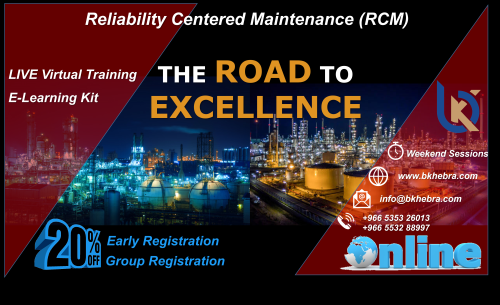| Training Code | Date | Duration | Venue | Fees |
|---|---|---|---|---|
| Keep following, we are updating our training schedules. | ||||

RCM has been around since long time and has been used extensively in Industry since the early 1990’s. RCM is a very structured approach however variations have been developed to streamline the process. Reliability Centered Maintenance (RCM) is a process used to determine what must be done to ensure that a physical asset (Machine – Production Stage – etc.) continues to do what its users want it to do in its present operating context for the longest possible period at the highest possible efficiency. RCM has a Long and Rich history of success in improving asset performance for industries and companies around the world and in many different industries. With so many different ways to follow how can a company interested in adopting RCM determine what approach to take? RCM II is the more rigorous development of RCM.
In this 5-days B. Khebra’s Reliability Centered Maintenance course participants will learn about RCM’s history and its founding principles. We will gradually build a Maintenance System based on RCM principles. Interactive sessions simulating an RCM analysis will provide participants with some appreciation of the RCM process and its relation to other maintenance methodologies. Case studies will be presented throughout the course to relate to practical side. It focuses on RCM applied in Industry, principally the Steel Industry, Power Sector and other discipline such as Oil & Gas Field.
Planners
Supervisors
Engineers
Reliability Engineers
Maintenance Team Leaders and Managers
Operations Team Leaders and Managers
On successful completion of this training course, BK’s Certificate with eligible Continuing Professional Education credits (CPE), will be awarded to the delegates , one CPE credit is granted per 50 minutes of attendance.